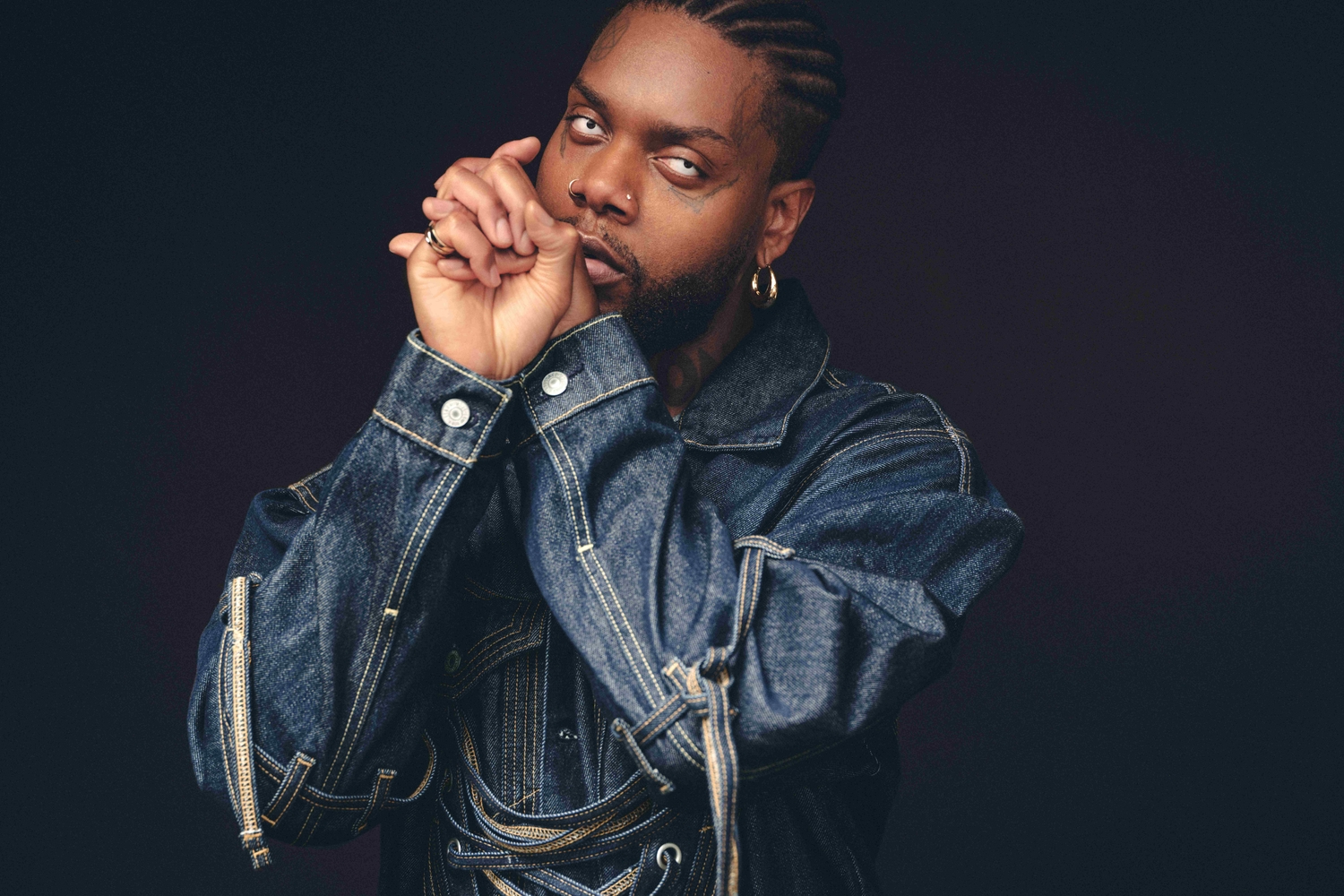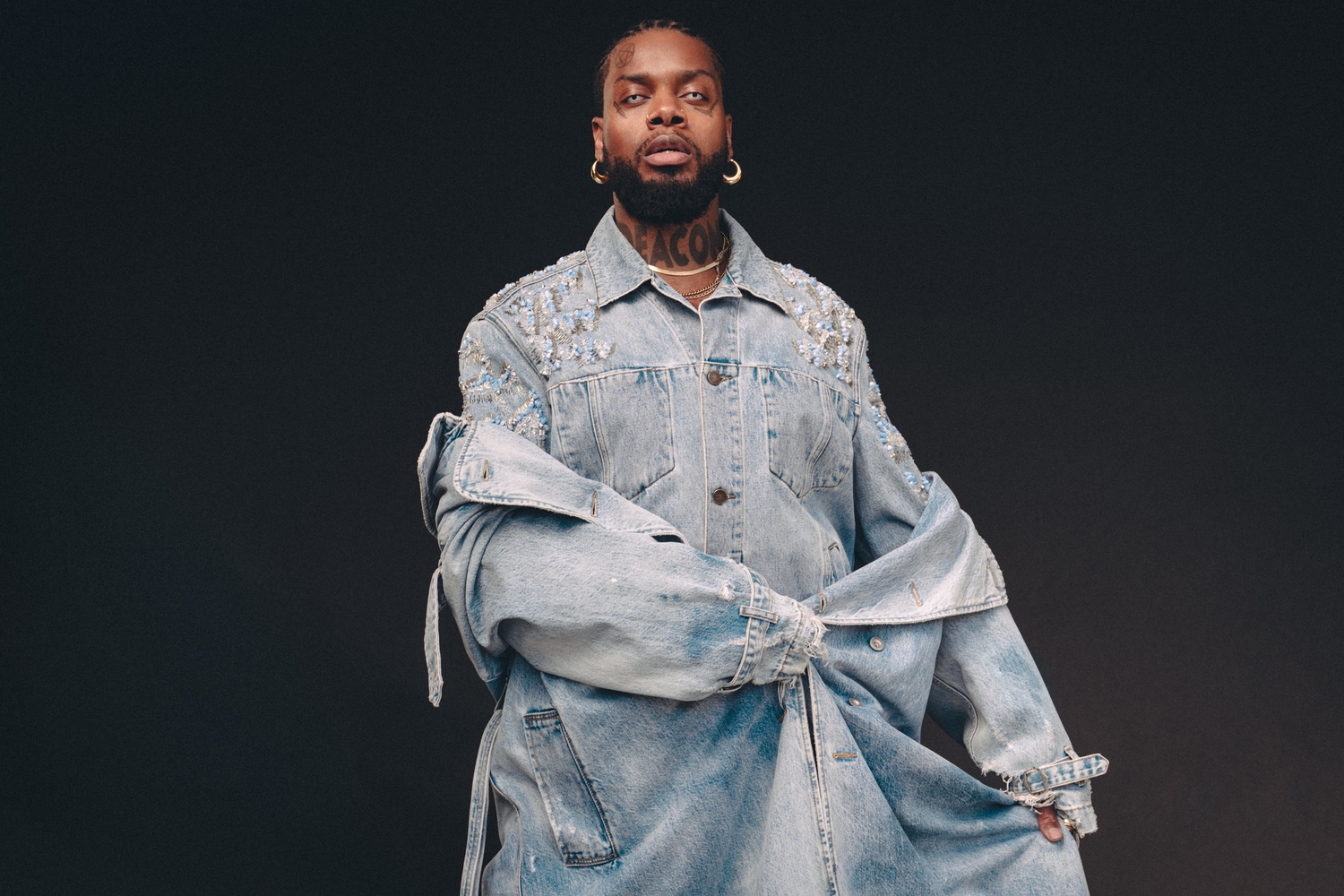
Interview serpentwithfeet: Let’s Get Physical
An album that prioritises intimacy and human sensation, ‘GRIP’ finds serpentwithfeet simultaneously softer and stronger than ever.
When serpentwithfeet’s music first started causing ripples in the late 2010s, the dense, head-spinning maximalism of tracks like ‘four ethers’ and ‘cherubin’ signalled the arrival of a major new voice in experimental music. For the Los Angeles-based musician, the worlds of gospel, R&B, electronic and classical co-existed in one aural space, and anything seemed possible. Where he would go next was anyone’s guess.
Two highly accomplished albums followed in the form of ‘soil’ (2018) and ‘DEACON’ (2021); both intricate, multi-layered and complex bodies of work. But with his new record ‘GRIP’, serpentwithfeet - born Josiah Wise, but who goes by the shortened form of his nom de plume, Serpent - presents an similarly more stripped-back version of himself, where the richness of the message is enhanced by the relative simplicity of the arrangements.
“I wanted to do something that felt a little more immediate and didn’t feel quite as abstract,” he explains over Zoom from his Los Angeles apartment. “I want something that feels like you know what’s going on within the first few seconds.”
With often little more than a modest assembly of samplers and synthesisers, lightly enhanced with treated guitar lines and tight, steamy vocal harmonies, ‘GRIP’ is a paradox: it is the most direct, streamlined version of serpentwithfeet to date, and yet also the most sonically exquisite and rewarding. “I think all the iterations of me are still me,” he considers, reflecting on the changes to his music over the years. “There are times when things need to have more weight and times when they need to feel more of the air. I think I’m just letting the pendulum swing.”
Serpent and his team of around ten producers – including Nosaj Thing and the collective I Like That – were painstakingly meticulous in the process of making ‘GRIP’ seem light to the touch. But whether it’s in the form of twitching banger ‘Damn Gloves’ or the intimate, sultry ‘Rum/Throwback’, one thing that’s paramount throughout the album is the glorification of physical human contact, whether in the public arena of a club or in the privacy of one’s own home.
“If god is a god at all, he lives in your grip,” he sings on ‘Lucky Me’, one of the tracks that takes us into a personal space behind closed doors. For an artist with a biblically evocative name, the line could be misconstrued as an iconoclastic provocation, but to Serpent, he is focused on the divine pleasure of holding a loved one close.
“I was thinking about the wonder of physical closeness, and somebody who you care about and who cares about you knowing how to touch you,” he says in his characteristically unhurried manner, taking his time to select his words. “It’s beautiful when we know the curves and contours of each other’s bodies; we know what things make us ticklish or what things arouse us, or what things soothe us after a difficult day. I wanted to make a project that rhapsodises about that.”


“It’s beautiful when we know the curves and contours of each other’s bodies. I wanted to make a project that rhapsodises about that.”
Queer Black love may continue to be under-represented in our culture, but while Serpent is clearly unafraid to be frank, he is careful not to frame himself as a spokesperson for any community. “I don’t know if what I’m doing is for representation,” he says. “I’m making the work I do because that’s who I am. I am a Black gay man, so I’m gonna write about that.”
Nevertheless, Serpent is acutely aware that by releasing a record like ‘GRIP’, he is creating the type of work that he himself struggled to find when he was growing up in Maryland in the 2000s. “The climate was very different,” he says. “The representation for queer people, in a way that felt full and whole and not the butt of a joke - I did not witness that much in mainstream media.”
The fact that an esoteric artist like Serpent is now able to articulate his lived experiences to an established audience has, in his opinion, as much to do with technological advances as anything else. “I think the internet did a beautiful thing in the 2010s; people were sharing their lives more. My generation were the guinea pigs for social media, and that started us expressing our lives, and in those moments the world started to feel a lot larger. It was like, ‘Oh wow, I didn’t realise that I have kindred souls that live in other countries, or that live down the street from me, but we wouldn’t have spoken otherwise.’ It really changed what we were willing to accept. Now, we’re like, ‘Mm-hmm, now I know I’m valid’.”
“My generation were the guinea pigs for social media… and in those moments the world started to feel a lot larger.”
Where, in a more analogue age, a demographically conservative coterie of gatekeepers wielded enormous cultural power in influencing what types of voices were able to rise to the fore, now artists from all backgrounds have the opportunity to be heard, and to create the platform that makes sense for their own artistic pursuits. For Serpent, that has meant not just the sonic and lyrical developments on ‘GRIP’, but also a step into the world of theatre.
Serpent wrote the show Heart of Brick alongside the poet Donte Collins as a companion piece to the album - a love story set in a Black gay club between Serpent’s character and a security guard. Dramatising ‘GRIP’’s songs on stage, Serpent grasped the opportunity to manifest the lusty, physical dimensions of this music that were already tangible into a show that received rave reviews from the New York Times and the LA Dance Chronicle.
“It was incredibly exciting to make a new kind of connection to an audience,” he says about the show, which toured across the US. “I love the theatre and I love creating albums, so I think I’ll be doing both for as long as I can.”
With serpentwithfeet now confidently producing fully-realised work that both fulfils the promise and ambition of those scattershot early releases and hones in on a true form of self-expression, it seems he has completed the puzzle. Fully unleashed, there’s nothing left to stand in his way.
Serpent, so far…
‘blisters’ EP (2016)
The debut serpentwithfeet release, produced alongside The Haxan Cloak, was written in a new musical language, pairing Serpent’s classically-trained instincts for virtuosity with a futurist take on electrified R&B.
‘soil’ LP (2018)
On his first full-length, Serpent’s deeply personal tales of love and the aches it leaves behind are chopped, multiplied and mutated in his kaleidoscopic musical playground. An album with sonic ideas to burn, it firmly cemented his early promise.
‘DEACON’ LP (2021)
The sound of Serpent appearing to find something approaching inner peace, ‘DEACON’ found him moving towards the light, with swooning, devotional songs about love and friendship incorporating pop elements alongside the ever-expanding mix.
‘GRIP’ LP (2024)
A distillation of the myriad sounds and genres of his earlier records, Serpent presents a slicker, more streamlined R&B aesthetic that straddles strutting club energy and introspective, delicate intimacy. A paean to the glory of human contact, it introduces an era of direct expression.
‘GRIP’ is out now via Secretly Canadian.
As featured in the February 2024 issue of DIY, out now.
Read More

Flow Festival Helsinki adds Aurora, Halsey, Janelle Monáe and more to 2024 lineup
They'll join the likes of Pulp, Fred again.., The Smile and Jessie Ware in Finland this August.
23rd April 2024, 9:00am

serpentwithfeet shares final album preview ‘Ellipsis’
The Orion Sun-featuring track lands ahead of the R&B artist's new album this Friday.
14th February 2024, 11:52am

serpentwithfeet - GRIP
4 Stars
A dynamic and sensual album, rich with imagery, peppered with romance, and imbued with joy.
14th February 2024, 7:58am

The Last Dinner Party are the cover stars of DIY’s February 2024 issue!
Our first issue of the new year also features Crawlers, IDLES, Yard Act, Remi Wolf and loads more.
29th January 2024, 4:00pm
With Bob Vylan, St Vincent, girl in red, Lizzy McAlpine and more.


